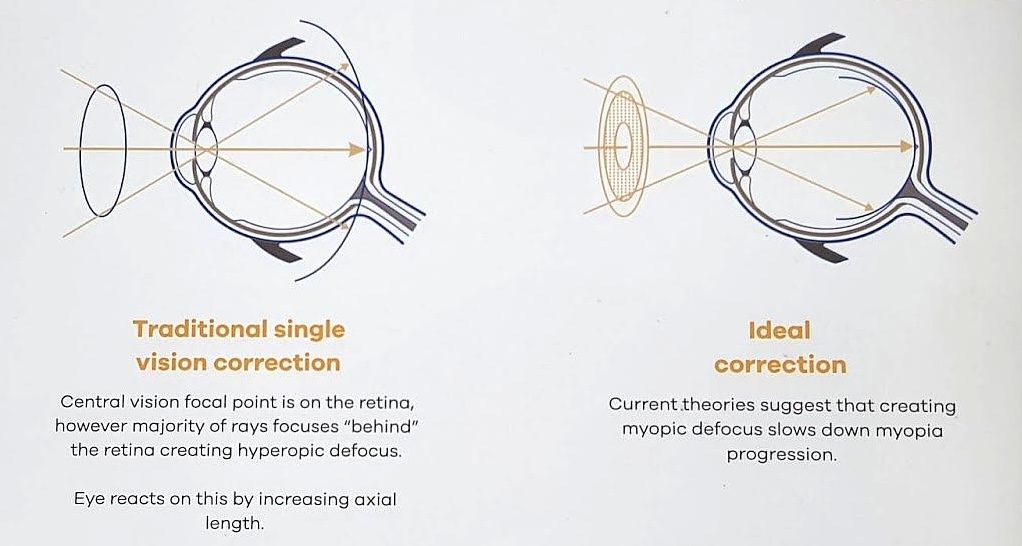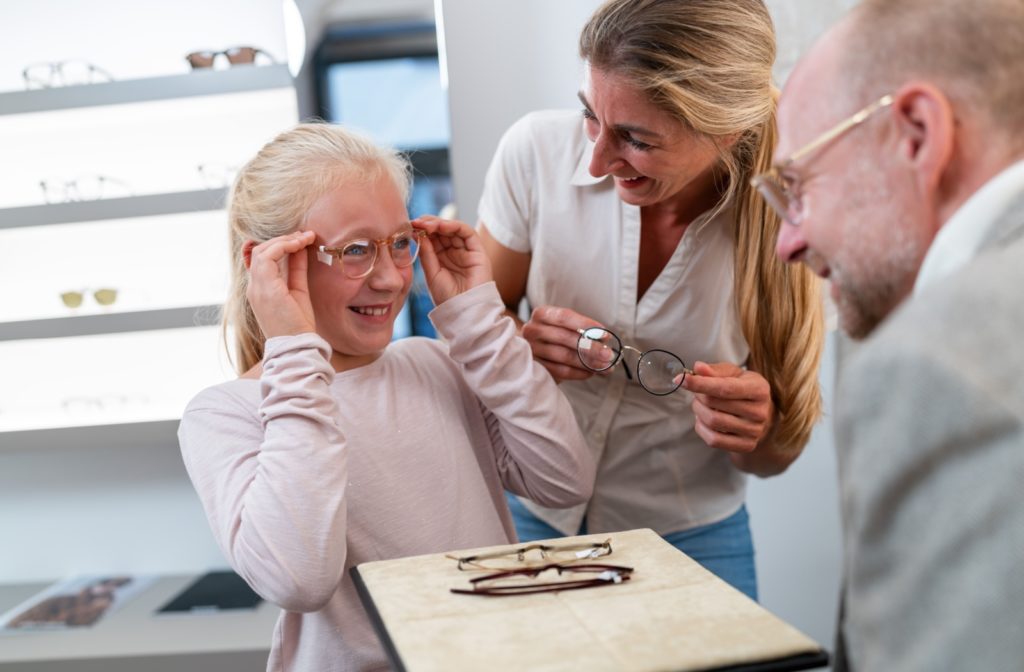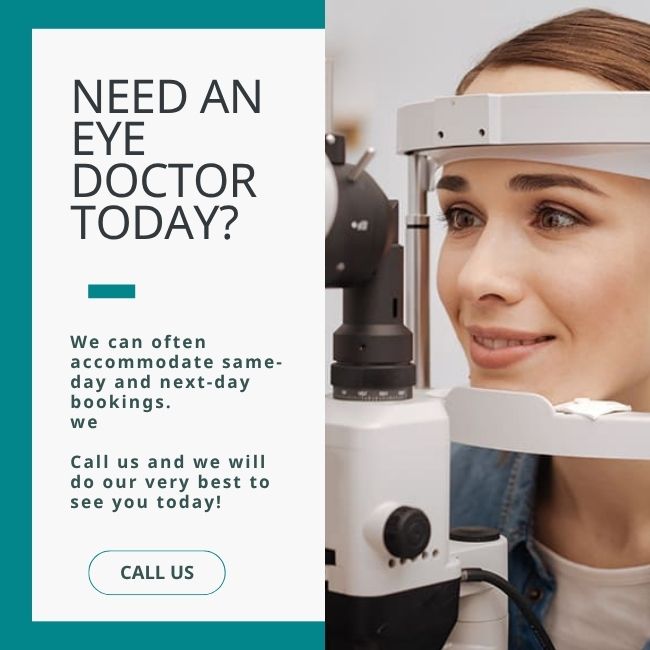Eyeglasses are the most popular form of vision correction. A simple yet powerful tool, glasses help maintain vision by using tailored lenses to redirect light onto the retina.
Modern eyeglasses have been used for decades, yet the misconceptions surrounding them continue. One common concern is the worry that glasses weaken the eye and allow our vision to worsen.
Eyeglasses don’t worsen vision, nor can they permanently improve it—in fact, glasses don’t physically alter the structure of the eye at all. Rather, glasses serve as a tool to compensate for deficiencies in the eye’s ability to focus light, thereby helping to maintain vision and ocular health.
Importance of Wearing Your Glasses
Eyeglasses correct vision by using lenses to refocus incoming light directly onto the retina at the back of the eye. The retina is the part of the eye that sends visual signals to the brain. If light doesn’t hit the retina correctly, the resulting signals may produce a blurry image.
In an eye with normal vision, light hits the retina directly, without any outside assistance. In an eye with a refractive error like myopia (nearsightedness), the eye’s shape prevents light from focusing correctly. In the case of myopia, the eye is too long, causing light to focus in front of the retina, making distant objects appear blurry.
Eyeglasses correct vision by adjusting how light focuses, ensuring it falls directly on the retina and counteracting blurry vision. You may wonder if wearing glasses is truly necessary. The short answer is yes, especially if your optometrist has advised you to wear your glasses full-time.
Not wearing your glasses, or using an incorrect or outdated prescription, can lead to several issues like eye strain, headaches, and worsening vision over time as your eyes try to overcompensate without corrective help. Wearing glasses not only enhances your vision for everyday activities like reading, driving, and working on digital devices but also plays a critical role in maintaining your ocular health.
One key area of concern is the progression of myopia, especially in children and teens. Without the corrective influence of glasses, the eyes continue to grow and change, potentially leading to more severe refractive errors and necessitating stronger prescriptions.
However, it’s important to note that traditional glasses alone don’t prevent myopia progression, rather they can only facilitate clear vision for the time being. Traditional glasses create hyperopic defocus which means a majority of rays fall behind the retina. In the long run, this leads to further elongation of the retina and ultimately, progression of myopia.
This is why specialized glasses like MiYOSMART lenses were developed for myopia control to help manage myopia progression and slow down eye elongation. Consistently wearing these glasses provides the most ideal results, highlighting the importance of wearing your glasses regularly.

What are MiYOSMART Lenses?
While regular glasses can correct myopia, they do not prevent its progression. MiYOSMART lenses, developed by HOYA, offer a revolutionary approach to managing myopia in children by incorporating specialized myopia control technology. These lenses use Defocus Incorporated Multiple Segments (D.I.M.S.) technology to slow down the elongation of the eye that leads to myopia progression. Studies show that wearing MiYOSMART lenses consistently can reduce myopia progression by up to 60%, providing a safe and effective option for children at risk of worsening myopia. Regular use of these lenses not only corrects vision but also offers a proactive solution to manage and slow down myopia progression.

Why Do Vision Prescriptions Become Stronger?
Glasses provide the necessary support for your eyes, helping them function without overexertion and providing increased visual clarity. Despite this, individuals may wonder why vision prescriptions change over time and, more specifically, why they often become stronger.
In fact, it’s common for vision prescriptions to change over time, even with consistent use of glasses. This is especially true of children, due to the fact that our eyes naturally grow and develop while we’re young.
During childhood, the eye’s structure is still maturing. The axial length of the eye, corneal curvature, and lens shape can all change, influencing a person’s vision as they do. Once the eye reaches a certain maturity (around age 20), these changes slow down, and prescriptions stabilize.
This natural change highlights the importance of routine eye exams. These visits help monitor changes in vision while examining ocular health, providing continuous support throughout different stages of life.
Wearing Glasses & Vision Worsening
Glasses are designed to correct existing refractive errors, not halt natural changes in eye anatomy. As our eyes continue to grow, factors like genetics, aging, and lifestyle all contribute to vision changes.
Ultimately, glasses help manage these changes, but they don’t cure the underlying condition. Instead, they offer a way to maintain visual clarity and prevent unnecessary eye strain.
Vision Changes with Age
With age comes further visual changes like presbyopia, cataracts, and low vision. Glasses remain a helpful tool in managing these age-related changes.
Presbyopia, for example, typically begins in the early 40s, and develops because the eye’s natural lens loses flexibility as we grow older, making it difficult to focus on close-up objects. Presbyopia can be corrected with multifocal lenses or reading glasses that provide additional magnification for our eyes.
Cataracts develop because the eye’s lens begins to cloud from protein deposits, leading to low vision and blurry or hazy vision. Updating glasses can help manage early to moderate levels of cataracts, but ultimately, surgery is required to target the underlying cause of visual obstruction.
Can Glasses Improve Vision?
While glasses serve as a tool to help manage vision by enhancing visual clarity and reducing eye strain, standard glasses can’t permanently improve vision. But in the same way that glasses can’t alter the eye’s structure to worsen vision, neither can they permanently improve vision.
Glasses are designed to immediately improve vision with wear. By reducing strain and helping the eyes to work efficiently, glasses prevent further deterioration and promote long-term visual health.
Consistently wearing glasses gives your eyes the necessary support to function without excessive strain. By correcting refractive errors, glasses help maintain visual stability, reducing the risk of worsening vision.
Schedule an Appointment
Glasses are a simple tool and effective tool designed to correct any refractive errors, provide visual clarity, and help maintain ocular health.
Updating your glasses as your visual needs change is necessary for maintaining good vision and ocular health, highlighting the importance of routine eye exams.
Connect with our team at Trinity Hills Eyecare to schedule an appointment for your routine eye exam and browse our unique selection of eyewear!




